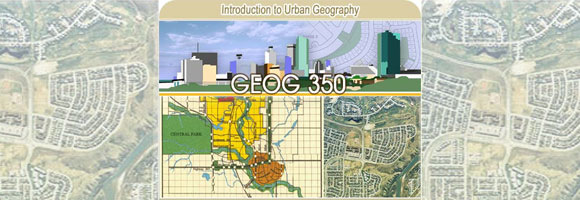
Course Description
Geography 350 is an interdisciplinary course focusing on the growth and development of Canadian Cities. Our cities will be viewed from different spatial perspectives and disciplines. At the national scale, students will study the Canadian urban system. At the regional scale, they will study city-wide processes. At the local scale, they will study the dynamics of urban development and the resultant internal geography of cities. The different disciplines contributing to this study of urban development are geography, economics, urban planning, sociology, and political science. Access to the internet and reliable computer are required. You need a current email address and should know how to send and receive email.
Intended Student
The course is designed for students who have a general interest in the growth and development of cities and students who have a particular interest in urban geography, urban studies, real estate development, and urban and regional planning. A background in urban studies or an associated field is not necessary, but it would be useful. In addition to its academic interest, this course would be of interest to persons active in community affairs, urban planning, real estate, and public administration.
Course Objectives
The course covers urban development from several different perspectives and scales: as a Canadian urban system, as metropolitan growth, and as urban structure and dynamics. The course focuses on:
- Current social, political, economic, and planning processes, issues, and problems found in our cities;
- Description and explanation of urban development and land use activity in cities;
- The environmental and social implications of urban growth; and
- The role of local government and planning in real estate development.
After completing the course the student should have a better understanding of the forces that shape our urban system, how urban areas develop, the problems of development, urban pathology, and how urban areas are planned and governed. This knowledge is useful to the student pursuing a career in urban planning, urban research, real estate market research, real estate development, and real estate appraisal.
Course Overview
- Urban Systems
- Overview of Urban Development in Canada
- The Canadian Urban Structure and System
- Growth and Transition in the Canadian Urban System
- City-Wide Process
- Real Estate, Transportation, and Communications
- Cities as Social Space
- Cities as Physical Space
- Internal Geography of the City
- Central and Suburban Downtowns and the Inner City
- The Suburbs and the City’s Countryside
- Land Use and Activities
- Work/Employment
- Housing and Shopping
- Governance and Planning
- Governance and Politics
- Urban Planning
Evaluation
- Neighbourhood project (group or individual)
- Participation
- Individual assignment
- Final exam
Learning Resources
The materials for this course consist of the GEOG 350 website (which contains the course contents, discussion forum and assignments) and a textbook.
Textbook:
Bunting,Trudi, Filion, Pierre and Walker, Ryan, editors. Canadian Cities in Transition: New Directions in the Twenty-First Century. 4th ed. Don Mills, ON: Oxford University Press. ISBN: 9780195431254
Optional:
Weston, Anthony.A Rulebook for Arguments. 4th ed. Hackett Publishing, 2008. ISBN: 9780872209541
